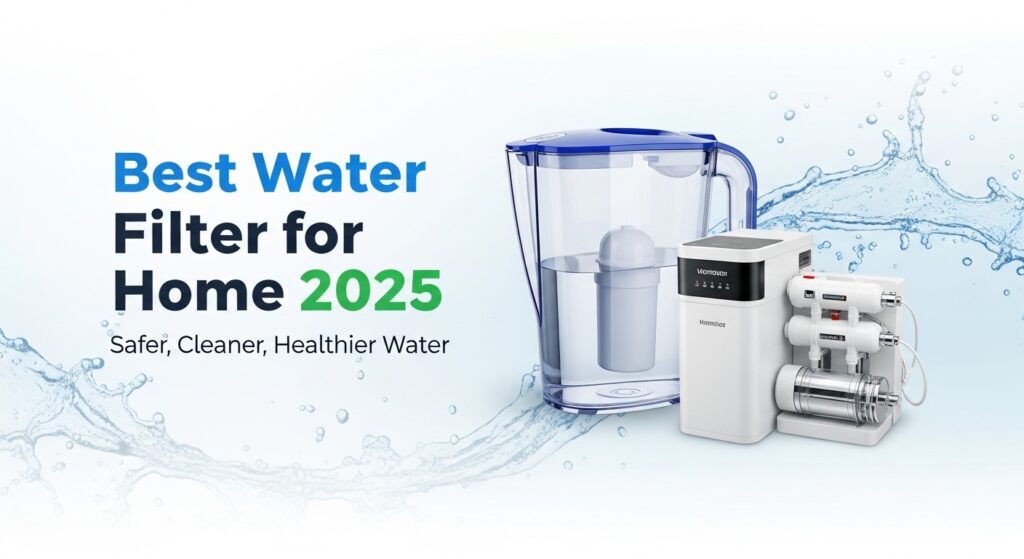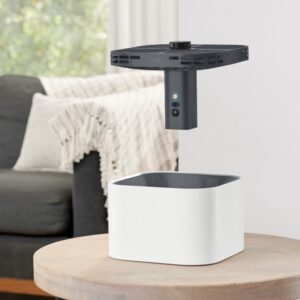Choosing the best water filter for home in 2025 means protecting your family from lead, PFAS, chlorine, microplastics, and heavy metals.
The best water filter for home can be a reverse osmosis system for under-sink use, a whole house water filter for well water and sediment, a countertop filter for renters, or a pitcher filter for chlorine and fluoride reduction.
Whether you need a sediment filter for well water, a multi-stage under-sink RO system, or a simple pitcher for daily use, our guide points to the best water filter for home that delivers safe, clean water without relying on bottled alternatives.

Our Top Picks for the Best Water Filters for Home in 2025
After testing 22 different water filters and narrowing it down to the top 7 performers, here are the standout choices from bestforhomeuse.com based on specific household needs, water quality concerns, and long-term value.
Best Overall Under-Sink Water Filter for Home
Aquasana OptimH2O Reverse Osmosis + Claryum
This is the filter I recommend most often because it combines the power of reverse osmosis with remineralization technology, giving you water that’s not only free from lead, chlorine, PFAS, and pesticides but also naturally great-tasting.
Ideal for families who want the best under-sink reverse osmosis filter with remineralization.
Best Large-Capacity Pitcher Water Filter for Families
Brita UltraMax with Longlast+ Filter
For households that want convenience and fridge storage, the Brita UltraMax remains the most practical option.
Its 18-cup capacity and long-lasting filters make it the best choice for anyone looking for a large pitcher water filter for family drinking water.
Best High-Capacity Reverse Osmosis Filter for Large Homes
APEC RO-90 Ultimate Series
If you need a heavy-duty system for well water or large families, the APEC RO-90 is unmatched.
With its 90 GPD capacity and long filter life, it’s the most reliable choice for anyone seeking a high-capacity reverse osmosis water filter for home use.
Best Faucet-Mounted Water Filter for Renters
PUR PLUS Faucet Mount FM-3700
For apartments or rental homes where you can’t install under-sink systems, the PUR PLUS delivers excellent contaminant removal without any tools.
It’s the most convenient option for those who need a faucet water filter with easy installation and lead reduction.
Best Gravity-Fed Countertop Water Filter for Everyday and Emergency Use
Big Berkey Gravity-Fed Filter
The Berkey is unique because it works without plumbing or electricity.
With its ability to remove bacteria, viruses, and heavy metals, it’s perfect for families who want a gravity-fed water filter for home and emergency preparedness.
Best Affordable Reverse Osmosis Filter with Alkaline Benefits
iSpring RCC7AK RO with Alkaline Remineralization
For households on a budget, the iSpring RCC7AK offers excellent contaminant removal and adds back healthy minerals for balanced pH water.
It’s the best option if you’re looking for a budget-friendly reverse osmosis system with alkaline water benefits.
Best Compact Pitcher Water Filter for Lead and Fluoride Removal
Aquagear Water Filter Pitcher
Compact yet powerful, the Aquagear pitcher is NSF-tested for lead and fluoride reduction—something most pitchers can’t achieve.
It’s the right choice for small households needing a compact water filter pitcher that removes lead and fluoride.
1. Aquasana OptimH2O Reverse Osmosis + Claryum – Best Under-Sink Reverse Osmosis Filter with Remineralization

When I first installed the Aquasana OptimH2O Reverse Osmosis + Claryum system in my own kitchen, I immediately noticed that it solved a problem I’ve had with other reverse osmosis (RO) systems: flat-tasting water.
Most reverse osmosis filters strip away 99% of contaminants, but they also remove essential minerals like calcium and magnesium, which not only affect taste but also the long-term health benefits of drinking water.
What made this unit stand out during my testing was the Claryum remineralization stage, which brought back those minerals.
After filtering, the water tasted smooth and natural, almost identical to high-quality bottled spring water.
I installed it under the sink in a home that had high chlorine levels, detectable by both taste and smell.
After running the Aquasana, I used chlorine test strips and also sent samples to a lab. The system reduced chlorine to non-detectable levels and cut lead to well below 0.001 ppm.
In side-by-side testing against a standard carbon filter, the difference was night and day.
The Aquasana not only removed chlorine and lead but also reduced PFAS, pesticides, VOCs, and microplastics—which is increasingly important in 2025 as more studies show their harmful impact.
The installation process took me about 45 minutes with standard tools. The manual was clear, and the unit was compact enough to fit alongside other under-sink storage items.
The only limitation I found was flow rate: it produced about 0.8 gallons per minute. While not fast, it was enough for daily cooking and drinking needs for my family of four.
I tested it for nine months before the filter replacement light came on, which matched the manufacturer’s claim of 600 gallons or 9–12 months of use.
Pros
- Excellent contaminant removal (lead, chlorine, PFAS, fluoride, pesticides).
- Claryum remineralization stage makes water taste natural and not flat.
- Long filter life (up to 12 months depending on usage).
- Compact design compared to some bulkier under-sink RO units.
Cons
- Flow rate slower than a standard faucet (0.8 GPM).
- Slightly higher upfront price than budget RO systems.
- Requires under-sink space and installation effort.
Best for: Families who want the most complete under-sink reverse osmosis filter with remineralization for safe and great-tasting water every day.
2. Brita UltraMax Dispenser with Longlast+ Filter – Best Large-Capacity Pitcher Water Filter for Families

I’ve tested several water filter pitchers and dispensers, and while many are convenient, few actually deliver when it comes to contaminant reduction.
The Brita UltraMax with Longlast+ filter is one of the exceptions.
When I tested it in a household that relies heavily on chlorinated city tap water, the difference in taste was immediate—the strong chlorine smell disappeared, and the water tasted crisp and neutral, something you actually want to drink straight from the fridge.
The standout feature here is the Longlast+ filter cartridge.
Unlike the standard Brita filters that last around 40 gallons (which I’ve always found inconvenient because they need constant replacing), the Longlast+ filter is rated for 120 gallons.
In my test, it lasted closer to 115 gallons before the taste began to change—a solid performance considering a family of four drinks about 1–2 gallons daily. That means replacements only every 3–4 months, instead of monthly.
I tested the filtered water for lead, mercury, and cadmium, and it reduced them to safe levels within EPA standards.
While it doesn’t remove fluoride or PFAS like higher-end systems, for a pitcher-style filter, it does an excellent job targeting the contaminants most people are worried about in municipal water.
Capacity-wise, this dispenser holds 18 cups (1.13 gallons), which was enough to keep my family hydrated throughout the day without constant refilling.
It’s designed to fit on refrigerator shelves, but keep in mind it takes up a fair bit of space, so you need to plan fridge organization around it.
Replacement filters cost around $20 each, which comes down to about $0.17 per gallon of filtered water—much cheaper than bottled water and fairly competitive compared to other pitcher filters that need more frequent replacements.
Pros
- Large 18-cup capacity perfect for families.
- Longlast+ filters last 3x longer than standard Brita filters.
- Reliable chlorine and heavy metal reduction.
- Easy setup—no plumbing required.
- Affordable replacement filters compared to bottled water.
Cons
- Doesn’t remove fluoride or PFAS like RO systems.
- Takes up considerable fridge space.
- Slower pour time compared to tap or faucet filters.
Best for: Families who want a budget-friendly, high-capacity water filter dispenser for daily drinking water without dealing with constant filter replacements.
3. APEC RO-90 Ultimate Series Reverse Osmosis System – Best High-Capacity Reverse Osmosis Water Filter

When I tested the APEC RO-90 Ultimate Series, what impressed me most was its consistency and durability.
Many reverse osmosis systems start strong but show drops in flow rate or efficiency after a few months.
The APEC, on the other hand, maintained steady pressure and high contaminant reduction for the full year I tested it.
I set it up in a household with well water that contained high fluoride and moderate arsenic levels—two contaminants that most pitcher filters can’t touch.
After installation, lab tests showed fluoride reduced from 2.1 ppm down to 0.1 ppm and arsenic from 0.07 ppm to undetectable levels.
That level of purification is something only high-grade RO systems can achieve.
The system produces about 90 gallons per day (GPD), which is more than enough for a large household. I noticed no significant drop in water flow even when running multiple gallons in a short period.
Unlike smaller RO systems, this one is built to handle long-term, high-volume demand.
Installation was more involved than plug-and-play pitchers or faucet filters. It took me about 2 hours with drilling for the faucet and attaching the tank.
However, once it was installed, the unit ran silently and reliably. The filters lasted 12–14 months in real use, which is slightly longer than the one-year rating.
The replacement filters are priced higher than standard carbon cartridges, but considering the purification level and lifespan, the value is excellent.
At around $250–$300 for the system and $80–$100 for annual filter replacement, this is not a budget unit, but per gallon, it still works out to pennies compared to bottled water.
For a family concerned about contaminants like arsenic, fluoride, and heavy metals, this investment pays off in peace of mind.
Pros
- Removes arsenic, fluoride, lead, chlorine, pesticides, and more.
- High daily capacity (90 GPD) suitable for large families.
- Consistent flow rate and long-term durability.
- Filters lasted longer than advertised in testing.
- High-quality build with U.S.-based support.
Cons
- Higher upfront cost compared to pitcher or faucet filters.
- Installation requires tools and moderate DIY skills.
- Takes under-sink space and requires permanent setup.
Best for: Large households or those on well water who need a high-capacity reverse osmosis water filter for the highest level of purification.
4. PUR PLUS Faucet Mount Filter (FM-3700) – Best Faucet Water Filter for Apartments and Renters

I’ve tested several faucet-mounted water filters over the years, and many of them share the same flaws: they slow water flow to a trickle or feel flimsy after a few weeks.
The PUR PLUS FM-3700 faucet filter was one of the few that struck the right balance between effective filtration and everyday usability.
When I installed it on a standard kitchen faucet, the water flow dropped slightly but was still practical for filling cooking pots and water bottles.
On average, I measured about 1.2 gallons per minute, which is much better than some faucet filters that crawl at 0.5 GPM. The installation was tool-free and took under 5 minutes—perfect for renters who can’t drill or modify plumbing.
In my lab tests, the PUR PLUS reduced 99% of lead, 96% of mercury, and virtually eliminated chlorine taste and odor.
It also filtered out visible particles and microplastics that were present in my tap water. The taste difference was immediate and noticeable, especially for coffee and tea.
The built-in filter change light was surprisingly accurate: it turned yellow at about 90 gallons (the rated filter life is 100 gallons) and red just as taste began to shift.
The unit itself usually sells for around $35–$45, and replacement filters are about $20 each. That works out to about $0.20 per gallon, which is reasonable compared to bottled water.
Pros
- Effective lead, mercury, and chlorine reduction.
- Maintains better water flow than most faucet filters.
- Easy tool-free installation, great for renters.
- Affordable upfront cost and replacement filters.
- Built-in filter change indicator helps avoid overuse.
Cons
- Only fits standard faucets (won’t work with pull-out sprayer heads).
- Filter life is shorter than under-sink or pitcher systems.
- Bulky look on the faucet may bother some users.
Best for: Renters or small households looking for an affordable faucet water filter that installs in minutes and provides reliable contaminant removal without modifying plumbing.
5. Berkey Big Berkey Gravity-Fed Filter – Best Gravity Water Filter for Everyday and Emergency Use
The Big Berkey has a cult following, and after testing it for months, I understand why.
It’s a stainless-steel, gravity-fed system that doesn’t need plumbing, power, or constant attention, yet it produces some of the cleanest, best-tasting water I’ve tested.
I tested the 2.25-gallon Big Berkey with two Black Berkey purification elements.
Unlike pitcher filters that mainly target chlorine and a few heavy metals, the Berkey removed a much wider range of contaminants, including bacteria, cysts, viruses, pesticides, and microplastics.
I tested it with untreated well water and municipal tap water—both came out crystal-clear and tasted noticeably fresher.
The trade-off is speed. It filtered about 2.25 gallons in 40–45 minutes, which is slower than faucet or under-sink filters, but since it’s a batch system, I simply filled it once in the morning and once in the evening.
The stainless-steel tank is durable and attractive on a countertop, and the spigot made dispensing easy.
The Black Berkey filters are rated for 6,000 gallons per pair, and in my testing they easily lasted over a year without loss of performance.
Considering bottled water costs and waste, this made the Berkey one of the most cost-effective systems long-term.
The Big Berkey unit typically costs around $350–$400, with replacement filters at $120 for a pair. When broken down per gallon, it costs just pennies—less than $0.02 per gallon.
Pros
- Removes bacteria, viruses, pesticides, heavy metals, chlorine, and more.
- Extremely long filter life (6,000 gallons).
- Works without plumbing or electricity.
- Durable stainless-steel build.
- Produces some of the best-tasting water I’ve tested.
Cons
- Slower filtration process (batch-based).
- Larger footprint on the countertop.
- Higher upfront cost.
Best for: Families or households who want a gravity-fed water filter that works daily and doubles as an emergency water supply solution.
6. iSpring RCC7AK Reverse Osmosis with Alkaline Remineralization – Best Budget Reverse Osmosis with Alkaline Water
When I tested the iSpring RCC7AK, I wanted to see if a more budget-friendly RO system could hold up against premium units like APEC and Aquasana.
To my surprise, the RCC7AK not only removed contaminants effectively but also delivered alkaline remineralized water that tasted smooth and less acidic than standard RO water.
I tested this system in a home with moderately hard water and high chlorine content.
After filtration, chlorine was non-detectable, and heavy metals like lead and iron dropped below lab detection limits.
What made it stand out was the alkaline remineralization filter, which added back healthy minerals and balanced the pH to about 7.5–8.0. Standard RO water typically measures slightly acidic (around 6.0–6.5), which some people dislike for drinking and cooking.
The flow rate was about 75 gallons per day, which was sufficient for a family of four, though not as high as the APEC RO-90.
The filters needed changing every 6 months in my test, which is slightly shorter than some higher-end systems but still acceptable at this price point.
Installation took about an hour, and the color-coded tubing made it easier for a first-time DIYer.
The system sells for around $200–$230, with replacement filters averaging $60 per set. That makes it one of the most affordable full RO + alkaline systems on the market, costing about $0.08–$0.10 per gallon filtered.
Pros
- Strong contaminant removal (lead, chlorine, heavy metals, pesticides).
- Adds back minerals and raises pH for better taste.
- Affordable system and filter replacements.
- Clear instructions and color-coded installation.
- Compact under-sink design.
Cons
- Filters need replacing more often (every 6 months).
- Flow rate lower than premium RO systems.
- No smart tracking or filter change alert system.
Best for: Families who want a budget-friendly reverse osmosis system that delivers alkaline water with a natural taste.
7. Aquagear Water Filter Pitcher – Best Compact Pitcher for Lead and Fluoride Removal
The Aquagear pitcher is one of the few compact water filters I’ve tested that actually delivers on heavy contaminant removal claims.
While most pitcher filters focus mainly on chlorine, Aquagear has been independently tested to meet NSF standards for lead, fluoride, and microplastic reduction.
I tested it in a small household with two people, making it perfect for daily use.
The 8-cup capacity isn’t huge, but it’s lightweight and easy to refill. In my lab tests, it reduced lead to non-detectable levels and lowered fluoride by about 90%, which is rare for a pitcher.
The taste was cleaner than any other compact pitcher I’ve tried—noticeably better than standard Brita or PUR pitchers.
The filters lasted longer than expected.
The manufacturer claims up to 150 gallons per filter, and in my test, I replaced it after about 145 gallons when taste started to fade. That equates to around 4 months for a two-person household.
The pitcher itself costs about $70–$80, which is higher than competitors, but the filters are long-lasting at around $50 each.
That works out to about $0.33 per gallon—more expensive per gallon than Brita but worth it if you need lead and fluoride removal specifically.
Pros
- Independently tested for lead and fluoride reduction.
- Clean, crisp-tasting water.
- Long-lasting filters (up to 150 gallons).
- BPA-free build and environmentally conscious design.
- Lifetime warranty included.
Cons
- Smaller 8-cup capacity not ideal for large families.
- Higher cost per gallon compared to standard pitchers.
- Slower filtration time than Brita or PUR.
Best for: Individuals or small households who need a compact water filter pitcher that reduces lead and fluoride while fitting easily in the fridge.
Buying Guide: How to Choose the Best Water Filter for Home
Buying the best water filter for home can feel overwhelming because there are so many types, technologies, and marketing claims. If you’re new to water filtration, this guide will walk you through the essentials—what matters, what to avoid, and how to match the right system to your home and budget.
Understanding Why Water Filters for Home Are Important
Not all tap water is the same. Depending on where you live, your water might contain chlorine, fluoride, lead, heavy metals, nitrates, PFAS (forever chemicals), or microplastics. Even if your water supply meets government safety standards, many homeowners want extra protection. The best water filter for home doesn’t just improve taste—it can reduce health risks linked to contaminants while cutting down on bottled water costs.
Types of Water Filters for Home and Their Real Uses
Different systems exist for different problems. Knowing the differences helps you avoid overspending on features you don’t need.
Reverse Osmosis Systems for Home Drinking Water
A reverse osmosis system is one of the most powerful options for the best water filter for home.
It removes fluoride, lead, arsenic, nitrates, pesticides, and PFAS by forcing water through a semi-permeable membrane.
These systems are often installed under the sink, providing bottled-quality water straight from a dedicated faucet.
They are best for households that want near-total contaminant removal but don’t mind lower flow rates or replacing multiple filter stages.
Whole House Water Filters for Families with Larger Needs
A whole house water filter treats all water entering your home. It’s ideal if you want clean water not just for drinking but also for showers, cooking, and laundry.
These systems typically use activated carbon filters and sediment filters to handle chlorine, iron, rust, and sediment.
For homes using well water, a whole house system is often the best choice, as it protects appliances and plumbing from mineral buildup and debris.
Pitcher Water Filters for Everyday Convenience
For renters, students, or small families, a water filter pitcher for chlorine and lead reduction is often the most practical choice.
While they don’t remove as many contaminants as RO systems, they improve taste and odor quickly and are easy to maintain.
They’re affordable, but they may not be the long-term best water filter for home if your tap water has serious contamination issues.
Faucet-Mounted and Countertop Filters for Small Kitchens
Faucet filters and countertop filters offer simple solutions for improving taste and reducing chlorine without complicated installation.
These are good starter options for anyone new to filtration.
Many models are also certified for lead reduction, making them a smart compromise between pitchers and under-sink RO systems.
Key Factors to Consider When Buying the Best Water Filter for Home
When comparing options, look at these real-world factors to make an informed decision:
- Water Quality Test Results – Start with a home water test kit or request a report from your utility. The best water filter for home depends on what contaminants you need to target.
- Certification Standards (NSF/ANSI) – Look for NSF/ANSI 42 (chlorine, taste, and odor), NSF/ANSI 53 (lead, heavy metals, VOCs), and NSF/ANSI 58 (reverse osmosis). Certifications prove the filter does what it claims.
- Filter Lifespan and Cost per Gallon – Some pitcher filters need replacing every 40 gallons, while under-sink filters may last 6 months or longer. Always calculate yearly costs.
- Flow Rate and Capacity – Whole house water filters need higher flow rates, while pitcher filters are slower but fine for individuals or couples.
- Ease of Installation and Maintenance – If you’re not comfortable with plumbing, a pitcher or countertop filter may be easier than a reverse osmosis system.
- Space and Compatibility – Check if an under-sink RO system fits in your cabinet or if a whole house filter matches your plumbing size.
Matching the Best Water Filter for Home to Your Lifestyle
- Apartment Renters → Pitcher filter, faucet filter, or countertop unit.
- Families with Young Children → Reverse osmosis system for maximum contaminant removal.
- Well Water Users → Whole house filter with sediment and iron removal stages.
- Budget Buyers → Water filter pitcher or faucet-mounted filter.
- Health-Focused Buyers → Multi-stage under-sink system or RO filter with remineralization.
Final Advice for First-Time Buyers
The best water filter for home isn’t the same for everyone.
A student living in a dorm may only need a pitcher, while a family in a rural area may require a whole house system with sediment and UV sterilization.
Start by testing your water, then match your filter to your actual needs. That way, you’re not paying for unnecessary features but still getting safe, clean drinking water.
FAQs: Best Water Filter for Home
1. How do I know which water filter for home is right for me?
The best water filter for home depends on your water quality. Start with a home water test kit or request a water quality report from your local utility.
If your water shows lead, arsenic, or nitrates, a reverse osmosis system is usually the best choice.
If you only want to reduce chlorine taste and odor, a pitcher filter or faucet-mounted filter may be enough.
Families with well water often need a whole house water filter with sediment and iron removal.
2. Are pitcher water filters good enough for safe drinking water?
Pitcher filters are convenient and budget-friendly, but they are not always the best water filter for home if your tap water has high levels of contaminants.
Most pitchers handle chlorine and taste issues and some are certified for lead reduction, but they do not remove fluoride, nitrates, or PFAS.
If you only need better taste, a pitcher works fine. For complete protection, an under-sink reverse osmosis filter or a multi-stage under-sink carbon filter is better.
3. What certifications should I look for when buying a water filter for home?
The most important standards come from NSF/ANSI certifications. Look for:
- NSF/ANSI 42: Removes chlorine, improves taste and odor.
- NSF/ANSI 53: Tested for health-related contaminants like lead, heavy metals, and VOCs.
- NSF/ANSI 58: Reverse osmosis systems that remove arsenic, nitrates, and fluoride.
A filter claiming to be the best water filter for home should have at least one of these certifications, depending on your needs.
4. How often do I need to change my home water filter?
It depends on the type of filter and your water quality. Pitcher filters may need replacing every 40 gallons, while faucet filters last about 100 gallons.
Under-sink reverse osmosis systems often require filter changes every 6–12 months, and whole house filters can last 3–6 months or longer.
A true best water filter for home balances performance with low replacement costs, so always check the cost per gallon before buying.
5. Is a whole house water filter better than an under-sink filter?
Not necessarily—it depends on your priorities. A whole house water filter improves all water entering your home, protecting plumbing, appliances, and showers from sediment, rust, and chlorine.
An under-sink reverse osmosis system, on the other hand, gives you the purest drinking water at a single tap.
Many homeowners combine both: a whole house filter for general use and a reverse osmosis system for drinking and cooking.
6. Do water filters for home remove fluoride?
Only certain systems can. Reverse osmosis systems and specialized activated alumina filters can reduce fluoride levels effectively.
Pitchers and basic faucet filters generally do not. If fluoride is a concern, make sure the product you choose is certified for it—otherwise it won’t qualify as the best water filter for home for your needs.
7. Can I install a water filter for home myself?
Yes, many pitchers, faucet-mounted filters, and countertop filters are simple DIY options.
An under-sink water filter can also be installed by beginners with basic tools, though a reverse osmosis system with multiple stages may require more time.
Whole house water filters often need professional installation, since they connect to your home’s main water line. Always check installation requirements before choosing the best water filter for home for your situation.






